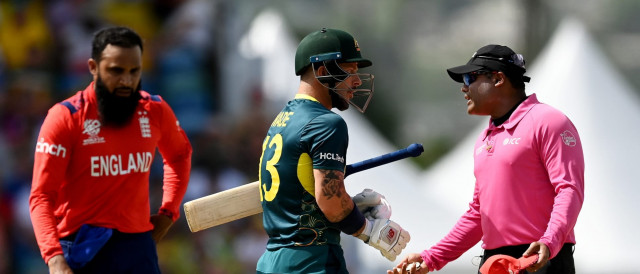Aussie Wade reprimanded for breach of ICC Code
A demerit point has been added to Wade’s disciplinary record

Australia player Matthew Wade has been handed an official reprimand for breaching Level 1 of the ICC Code of Conduct during a Group B match of the ICC Men’s T20 World Cup 2024 against England at the Kensington Oval in Barbados on Saturday.
Wade was found to have breached Article 2.8 of the ICC Code of Conduct for Players and Player Support Personnel, which relates to “showing dissent at an umpire’s decision during an International Match.”
In addition to this, one demerit point has been added to Wade’s disciplinary record, for whom it was the first offence in a 24-month period.
The incident occurred in the 18th over of Australia’s innings. Wade played a delivery from leg-spinner Adil Rashid back to the bowler but expected it to be called a ‘dead ball’ by the umpire. When it wasn’t, Wade then argued with the umpires over the decision.
Wade admitted the offence and accepted the sanction proposed by Andy Pycroft of the Emirates ICC Elite Panel of Match Referees, so there was no need for a formal hearing. On-field umpires Nitin Menon and Joel Wilson, third umpire Asif Yaqoob and fourth umpire Jayaraman Madangopal levelled the charge.
Level 1 breaches carry a minimum penalty of an official reprimand, a maximum penalty of 50 per cent of a player’s match fee, and one or two demerit points.
Nepal’s Lamichhane to join squad in West Indies
Sandeep Lamichhane will join Nepal’s T20 World Cup squad in the West Indies after missing matches in the United States because his visa was denied, the cricket association said Monday.
Nepal had originally wanted to select former skipper Lamichhane, who had an eight-year sentence for rape quashed on appeal, but his US visa was denied twice despite intense lobbying.
Spin bowler Lamichhane, 23, was once the poster boy for cricket in Nepal, but was convicted for raping a young woman in a Kathmandu hotel in 2022. That was quashed last month. Nepal lost to the Netherlands by six wickets in their World Cup opener.



















COMMENTS
Comments are moderated and generally will be posted if they are on-topic and not abusive.
For more information, please see our Comments FAQ